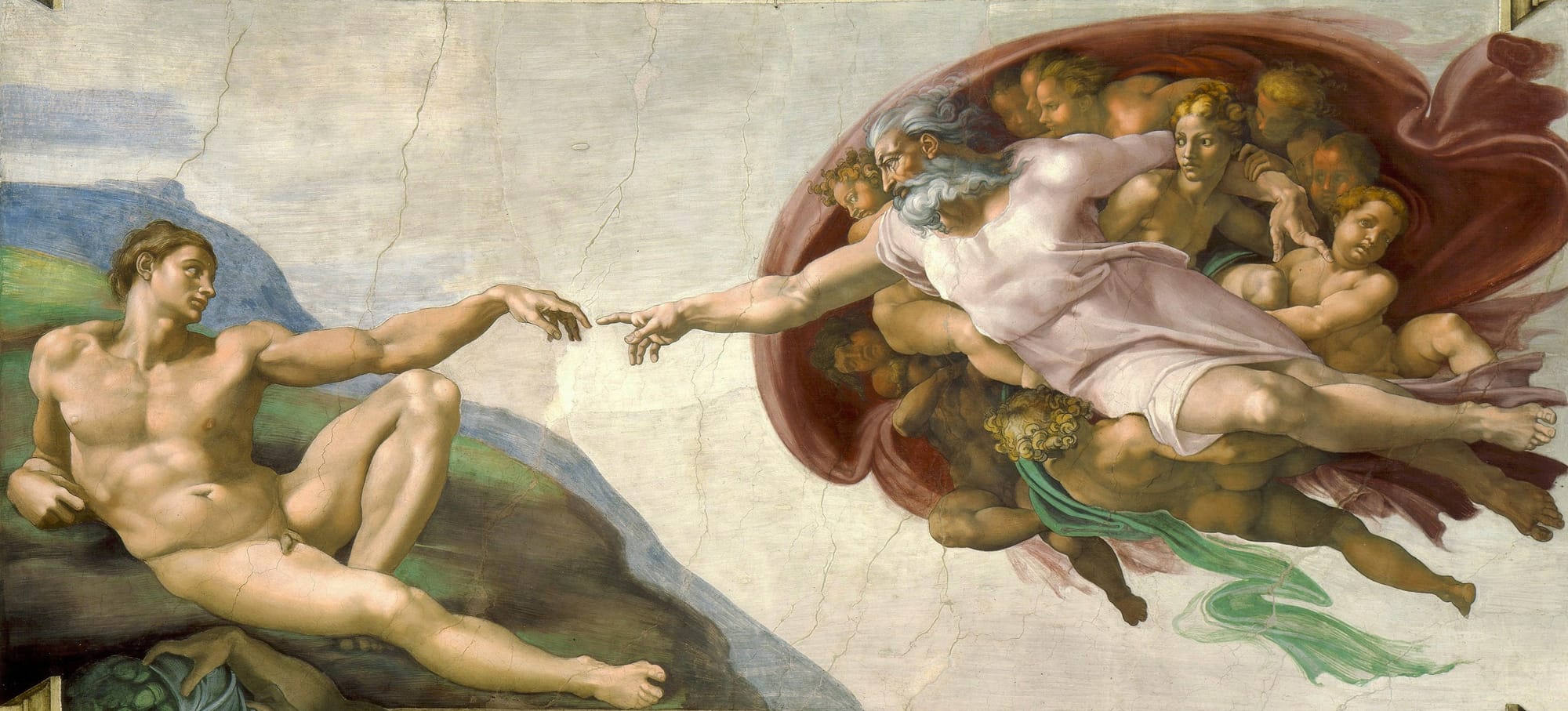The Man Who Wasn't There
How can we continue to evaluate the world and our place in it, when the evaluative standard itself loses its substance? How can we know if the future we are hurtling toward is good, and what should good mean anyway?

Last week, Louise Perry had a very thoughtful piece examining some of the ethical dilemmas posed by recent breakthroughs in “preimplantation genetic testing for polygenic disorders” aka “polygenic screening” aka eugenics. For years now, modern medicine has allowed parents the option of prenatal testing for conditions like Down’s Syndrome, as well as more serious and fatal ones (which, it must be said, allows them the option to abort the fetus).
Polygenic screening, however, will allow people to go beyond this in selecting for preferred traits--not just avoiding defects but actively choosing desirable mental and physical attributes, from height to hair color to intelligence. Those without will continue to play the genetic lottery, as it were, while those with the means will be playing something else entirely.
Perry delicately (and, I think non-moralistically) explores some of the tensions here between our intuitions and our practices. That is, while this stuff may give (some of) us the willies, it is really but an extension of what we already do. The process by which gay men and women, for example, choose egg or sperm donors is essentially eugenic, in which the preferred option is chosen based on looks, education, and so on. More broadly, we have consistently and understandably accepted any development that would improve the health and happiness of our children. Why should this be any different?
Her essay, however, leaves implicit the main question I was left with: what does this mean for our understanding of what it is to be human?
It is certainly true that we have already subjected so much of what was once determined by chance (hey there Prince 25) to our own will. This has been a general process unfolding over the past 500 years now, but just on the level of medicine, we have vaccinations, screening and treatment for major diseases, corrective procedures or devices for various disabilities, and so on. But this selecting for preferred traits at this level I think goes beyond that. It represents the conquest and settlement of yet another of nature’s wild continents. The flag of scientific mastery planted over territory we once ceded to fortune, and ventured into only by prayer.
Further, whereas our other interventions have tended to be egalitarian in nature (e.g., ensuring that otherwise sickly children survive to adulthood), this is a move in the opposite direction, and one that might concern those of us wedded to certain basic notions of human equality. One can view this is as an essentially religious (really, Christian) opposition. But here is George Scialabba, a man of the secular left, making substantively the same point:
If we cannot slow down and grow cautiously, evenly, gradually into our new technological and political possibilities and responsibilities—even the potentially liberating ones—the last recognizably individual men and women may give place, before too many more generations, to the simultaneously sub- and super-human civilization of the hive.
This is ultimately a problem of humanism, which is not new. 2500 years ago, the sophist Protagoras proclaimed that “Man is the measure of all things,” and since then we've been trying to figure out the denomination and extent of that measurement. Making ourselves the subject, to use Montaigne's words, seems like a more straightforward business than trying to understand the whole of the cosmos and our place in it. But then man is such a slippery thing. Moreover, we are historical beings, such that our status (which was never precisely determined) has changed significantly over time.

Tzvetan Todorov introduces his magnificent work on humanism, Imperfect Garden, by making poetic reference to three pacts with Satan: The first, offered to Jesus, concerned power over the things of this world. Jesus rejected it but his successors, the Christian monarchs, would come to accept it. The second concerned not power but knowledge of the things of this world. It was accepted by Goethe’s Faustus, though he came to regret his choice.
The third, with which Todorov is most interested, is more insidious for never having taken place at all. This pact concerned not power or knowledge but free will. And the devil’s trick here was to persuade us that we had done this ourselves, and thus there would be no price to pay.
In fact, the price took many forms. The loss of G-d, the loss of the bonds of community in the face of the freedoms of atomistic individuals. And finally, the loss of the self:
You will then try to cling to your self, but this too will be threatened by dislocation. You will be swept by currents beyond your control; you will believe you are deciding, choosing, and willing freely, when in truth these subterranean forces will do it for you, and you will lose the advantages that had seemed to justify all these sacrifices. This self will be nothing but an anomalous collection of impulses, an infinite dispersal; you will be an alienated, inauthentic being, no longer deserving to be called a “subject.”
It is almost Kafkaesque— in the end you get everything you wanted but the “you” that wanted them is long gone. If “man is the measure,” in other words, then what happens when he is no longer himself? How can we continue to evaluate the world and our place in it, when the evaluative standard itself loses its substance? How can we know if the future we are hurtling toward is good, and what should good mean anyway?
It seems to be in the nature of the issues raised by this science that it raises question after question. And I think it is fair to say that those most invested (literally and figuratively) in these advancements tend not to inquire into what makes us human. Nor do they seem to assign much value to these questions when posed by others. Here for example is Scott Alexander, a Bay Area rationalist who is much-read around Silicon Valley, making the case for Ozempic:
I come at semaglutide from a transhumanist perspective. I want to hack genetics and biology until everyone is as tall as they want, as strong as they want, as smart as they want, and whatever gender they want. If you want wings, you should be able to have wings. And yes, part of this vision is everyone having the weight they want.
Transhumanism is of course le mot juste – a quasi-philosophical movement dedicated to the physical enhancement the human animal, up to and including merging ourselves with machines and even defeating death. Now such a project presupposes that the human qua human is either an uninteresting subject for exploration or that its deficiencies are sufficiently obvious that the proper focus of our intelligence is on various remedies.
Reading Alexander’s mini-manifesto above, one is struck by what looks like the reappearance of the good old Jeffersonian pursuit of happiness in science-fiction form. The trouble comes with the basis for that thing, happiness, which has always relied upon some understanding of what it means to be human. Aristotle, Epicurus, Marcus Aurelius, Rousseau, Freud, and others all have varying accounts.
In any case, ordinary observation should suffice to dispel the notion that a person devoted wholly to the unending fulfillment of their own desires is somehow happy. One need not be a Buddhist to see the freedom to pursue such happiness in the absence of any reflection upon the value of such a pursuit as a kind of trap. If this all seems too abstract, anyone who wants a glimpse of what the trapped free man must look like need only look to the social media feed of Bryan Johnson, the billionaire charting his attempts to defeat death.
Can my joints age backwards?
— Bryan Johnson /dd (@bryan_johnson) June 25, 2024
I received a cutting-edge therapy aimed at achieving age 18 joints, at a clinic owned by Tiger Woods & Justin Timberlake.
300 million young Swedish bone marrow mesenchymal stem cells were injected into my shoulders, hips, joints.
🧵Here’s why… pic.twitter.com/qWhHCW81ly
Don't be this guy
We are born, we age, we die. The capacity of modern science to “ease man’s estate” has been an extraordinary gift to ourselves. It is thanks ultimately to that revolution (and especially the great gains in medical science that began in the 20th century) that more of us are born in the first place, that our allotted duration has been extended, and that our experience of it generally involves far less physical suffering than in the past.
Meanwhile, the willingness to treat ourselves as matter to be examined and used is hardly innovative at this point. Michelangelo and Leonarda da Vinci robbed graves so they could more recreate the human form with exactitude in their art, and one can witness the fruits of their labor in the extraordinary representations of bodies at rest and in motion.

Nor is this merely of aesthetic interest. When you get your driver’s license, you are asked to declare whether you intend be an organ donor in the event of your death—in which event pieces of your dead body will be removed and replaced into another person’s living one, like swapping out automotive parts to keep a Ford Mustang convertible running for a few more years.
All of this is to say that we are already primed to see this as normal. But what we may increasingly see in the near future is not just changes to our existing bodies but changes to the possibility of embodied humanity in the first place. The code being rewritten by polygenic screening (and who knows beyond that?) is the source code. It is not this or that program but the human operating system itself that will be subject to tinkering. Now proponents will argue—not incorrectly—that this is merely the conscious (and arguably more humane) application of the underlying evolutionary process that produces us in the first place. And to some degree we already do this: instead of allowing the cruel vicissitudes of natural selection to determine who gets born and who lives long enough to reproduce, we bring to bear the marvels of modern medicine and technology to ensure that once unviable infants survive.
We do this with an eye to ensuring that life prevails as much as possible. But now it will be that our purpose is guided not by the principle of “more life” but some unclear version of “better” life—even as our means of gauging better from worse is itself uprooted. I suspect one of the recurring themes in the coming years will be this: as we continue to modify our very nature—from projects to extend the human lifespan, to surgical modifications to change our sex, to gene therapies to root out Mendelian defects at the origin—what happens when the subject and object dissolve into one? Who is the “we” that is acting upon ourselves?
All of these processes inevitably invite references to slippery slopes. But then I think even slippery slopes have varying gradients. And I wonder which new breakthrough proves to be not a slope at all, but a sheer drop-off into nothingness that plummets down and down and down.
